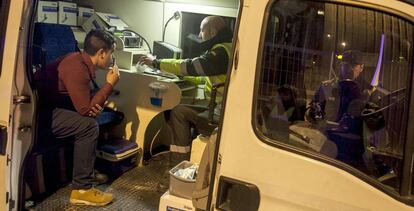Convictions for driving under the influence jump 10% in Spain
More than 40% of drivers killed in traffic accidents had consumed alcohol or drugs, according to data from the Prosecutor General’s Office

Preliminary data offered by Spain’s Prosecutor General’s Office show a 10% rise in just one year in convictions for driving under the influence of alcohol or drugs.
These convictions grew to 56,173 in 2018, compared with 51,085 in 2017, representing 21% of all convictions for any kind of crime. More than 40% of drivers who died in traffic accidents had consumed alcohol or drugs.
The previous government of Mariano Rajoy made deep cuts to breath testing and road patrols
Pere Navarro, head of the DGT national traffic authority, has ruled out introducing tougher penalties for violators. “It’s not clear to me that the solution lies in higher penalties. At some point we might have to do it, but we don’t support it,” he said last summer.
Instead, Navarro said that the priority is to increase roadside checks to avoid “a feeling of impunity.”
Such a rise would signal a change following deep cuts made under the previous administration of former Popular Party (PP) Prime Mininster Mariano Rajoy. Under Rajoy, alcohol breath tests were reduced by 20% on Spain’s roads.
In 2013, the Civil Guard screened more than 6.4 million drivers to see if they had more than the legal limit of alcohol in their bloodstream. Three years later, there were 5.07 million tests, and in 2017 there were 5.18 million.
“When it comes to alcohol, unlike other drugs, an increase in preventive testing shows no evidence of being effective once we have reached the goal of creating awareness among the general driving population,” said then-Interior Minister Juan Ignacio Zoido. The drop in breathalyzer tests was accompanied by a reduction in Civil Guard officers on traffic duty.
In September of last year, Navarro said that 250 more officers would start patrolling the roads in October, and that another 400 would be added in 2019.
Other violations
Most court convictions for driving offenses involve being under the influence of alcohol or drugs at the wheel, but they are not the only ones. In 2018, 28,868 drivers were found guilty of driving without a license, 2,797 refused to take a breathalyzer test, 872 were sanctioned for reckless driving, 450 for speeding, 60 for showing “a manifest contempt for the lives of others” (such as so-called “kamikaze” drivers), and 44 for other types of risky behavior on the road.
Last year, a total of 89,264 people were convicted of driving offenses, representing 34% of all convictions for any crime. This is an 8.9% rise from 2017, but remains below the figure of 92,682 convictions in 2014.
Meanwhile, road fatalities fell to 1,180 last year, compared with 1,198 in 2017.
English version by Susana Urra.
Tu suscripción se está usando en otro dispositivo
¿Quieres añadir otro usuario a tu suscripción?
Si continúas leyendo en este dispositivo, no se podrá leer en el otro.
FlechaTu suscripción se está usando en otro dispositivo y solo puedes acceder a EL PAÍS desde un dispositivo a la vez.
Si quieres compartir tu cuenta, cambia tu suscripción a la modalidad Premium, así podrás añadir otro usuario. Cada uno accederá con su propia cuenta de email, lo que os permitirá personalizar vuestra experiencia en EL PAÍS.
¿Tienes una suscripción de empresa? Accede aquí para contratar más cuentas.
En el caso de no saber quién está usando tu cuenta, te recomendamos cambiar tu contraseña aquí.
Si decides continuar compartiendo tu cuenta, este mensaje se mostrará en tu dispositivo y en el de la otra persona que está usando tu cuenta de forma indefinida, afectando a tu experiencia de lectura. Puedes consultar aquí los términos y condiciones de la suscripción digital.









































